Features
Q&A with Mother Labs
Published on October 29, 2021 by David Wylie
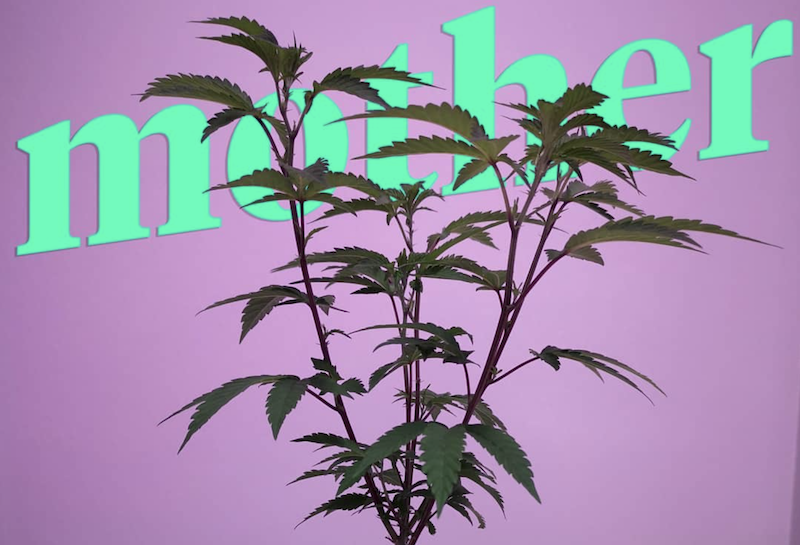
We spoke to Mother Labs CEO Brian Bain.
Mother Labs is the largest full-service cannabis nursery and supplier in North America.
The company is one of the most unseen players in the cannabis space, even though they have 50-60 different cultivars in the market.
“We’re a quiet player,” Bain tells the oz.
Located in Saskatoon, Mother Labs employs about 60 people. It has strong ties to BC, and to the Okanagan. Both True Leaf Brands in the North Okanagan and JBuds in Summerland (under the Pistol & Paris label) grew Mother Labs’ Orange Tingz genetics.
Here’s our Q&A:
the oz. — Can you talk a little bit about your background and how Mother Labs came to be?
Bain — I started in cannabis. I’ve been growing cannabis since I was 16 years old. I became a horticulturalist because I really didn’t want to go to jail. So I ended up with herbs. That’s the way I saw to getting out of the game and legitimizing my life for my wife and my son. I made the switch to grow products that were very needed in my province. I found out there was a lack of local products—healthy sustainable products—and that we imported a lot of our food. I did that as a passion project to feed people. Health Canada announced the nursery option a few years back. It was very similar to what we were doing with the herbs. We were doing rapid plant production. We grew plants two to three weeks before we shipped them out. We shipped living products, and we shipped living products around Canada. The food safety side really played heavily into cannabis. When we made the switch it was a very fluid and simple switch. We kept 14 employees on while we expanded and retrofitted the facility. We run the farm very similar to how we did the food. Basil was, oddly enough, much harder to ship than cannabis. So that prepped us.
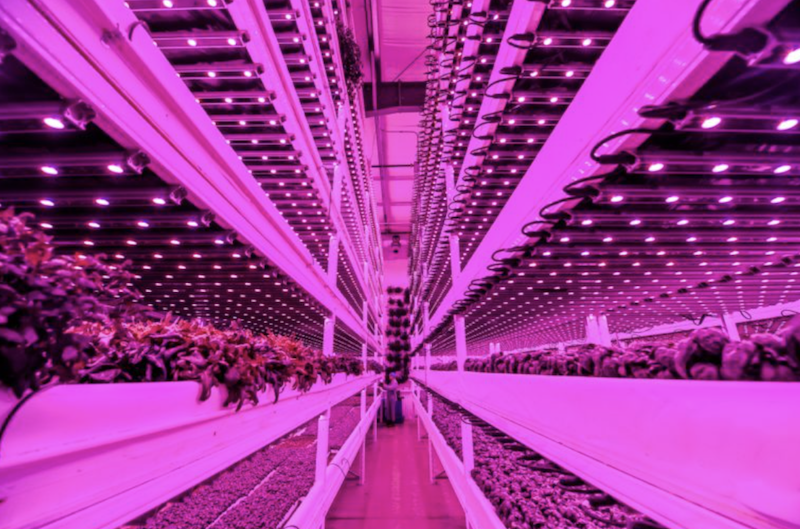 Photo: Mother Labs
Photo: Mother Labs the oz. — It’s fascinating seeing the way that you grow vertically, nearly 30 feet high.
Bain — It’s necessary. We grow in the city, where lease rates are very high. And I’m not a farmer. I grew up in an apartment building, with a single parent, no real garden space, growing herbs on a patio. For me it’s second nature, I don’t really know traditional egg-to-egg life.
the oz. — You’ve done an international-first by sending cannabis genetics to South Africa; how did that come about and what’s the significance?
Bain — We made connections at a conference that led into a year of conversations and quite a bit of due diligence in the company in South Africa. But it led to a lot of work. It’s the first successful shipment for us internationally. It’s helping the world see that we can accomplish this, that we’re successful in shipping a large volume of plants to another country. We also helped develop the SOPs in South Africa with the government. They didn’t really have a knowledge base in how to receive tissue culture plants.
the oz. — How did you ship them?
Bain — We fly the majority of our products. We flew them on a plane with GPS trackers, temperature trackers, humidity trackers, and follow the shipment from the second it left our facility to the second it landed.
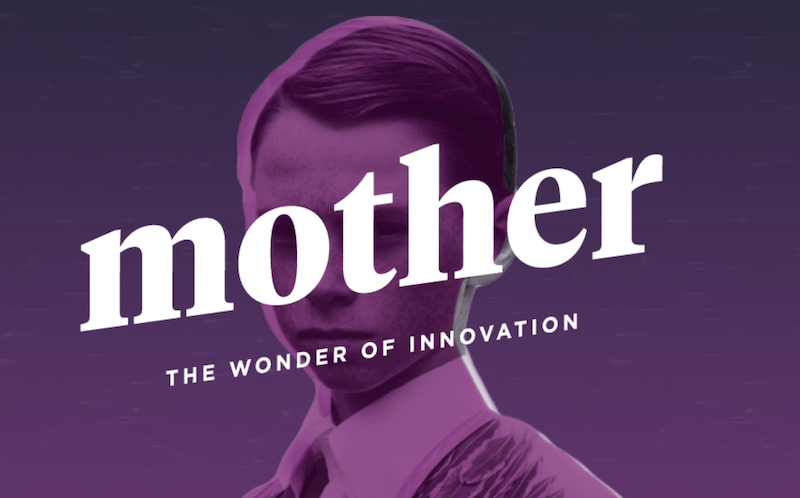 Photo: Mother Labs
Photo: Mother Labs the oz. — What was the inspiration behind the branding?
Bain — Be different. Be unique. When we started our company there was a lot of ‘Canna’ and ‘Medi’, a lot of these common names that you see over and over and over again. We wanted to create a real brand in cannabis. We are a B2B (business to business) company, we sell to a lot of other businesses. It’s difficult for us to get a B2C (business to consumer) presence and get out into the world. So we had to create a brand that stood out and a brand that made people ask questions. That’s why it looks a little scary, or a little bit off the wall, a little bit atypical, it’s just because we had to be talked about, we had to stand out. It’s played out very well for us. The colours and the brand were different than any other player in the entire cannabis space in Canada. The logo’s basic, the word ‘mother’ really it’s what we are. We’re here to help the industry grow.
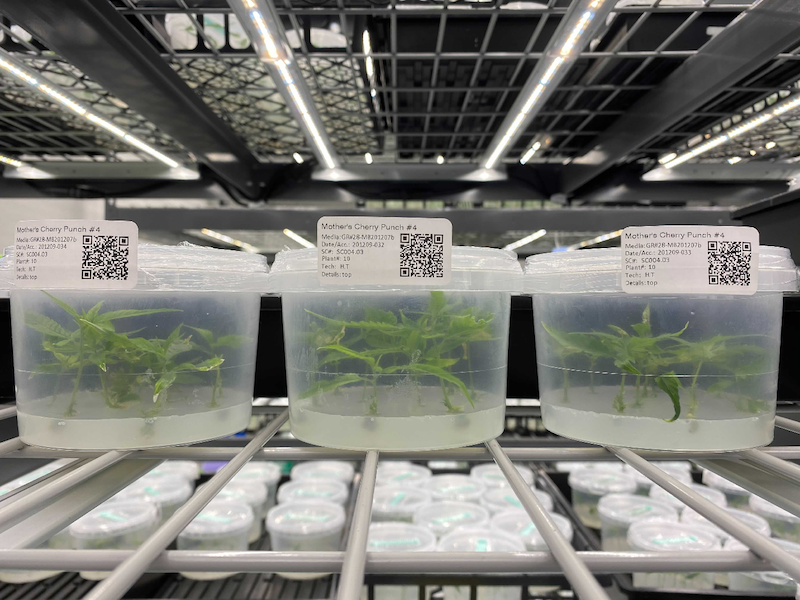 Photo: Mother Labs
Photo: Mother Labs the oz. — In Canada, where do you find the demand for clones is coming from?
Bain — For clones and teens, generally you get the micro-cultivators and small-scale LPs. Genetic licensing is more for the larger players. Small players are more of a supply; large players more of a service model.
the oz. — How many different genetics do you have?
Bain — A lot. Currently in our TC (tissue and culture) lab, we have over 150 living phenotype genetics that we have COAs (certificate of analysis) for and we’ve done analytic research on. We have another 5,000-10,000 different individual cultivars in seed form, as well as many, many, many undefined cultivars that we’ve bred with in seed form as well. The number is huge. The amount of potential genetics is even larger. We’re actively breeding all the time. We have to help the industry diversify. The name of the game for us right now is exclusivity. Everyone we’re dealing with now wants genetic exclusivity. We’re working hard at increasing the volume of genetics we have—high-quality, unicorn genetics—so we can offer everyone their own unique product. That’s really our push in the next year or two.
the oz. — Do you help with tips and tricks on how to get the most out of the genetics?
Bain — Yes, we do. For our cultivars, we spend a lot of time and a lot of money tracking data. When we’re phenotyping and going through different genetics, we’re taking photos from the beginning of the plant’s life all the way to the end of flower. Throughout the whole process we’re taking growers’ notes on everything. We try and compile a giant database for every cultivar we have and then we go and teach the client. We have to do as much as we can to give people the best chance they have because there’s a lot of competition on the market; there’s a lot of ways people can lose their shirts. It’s a very challenging industry to be in.
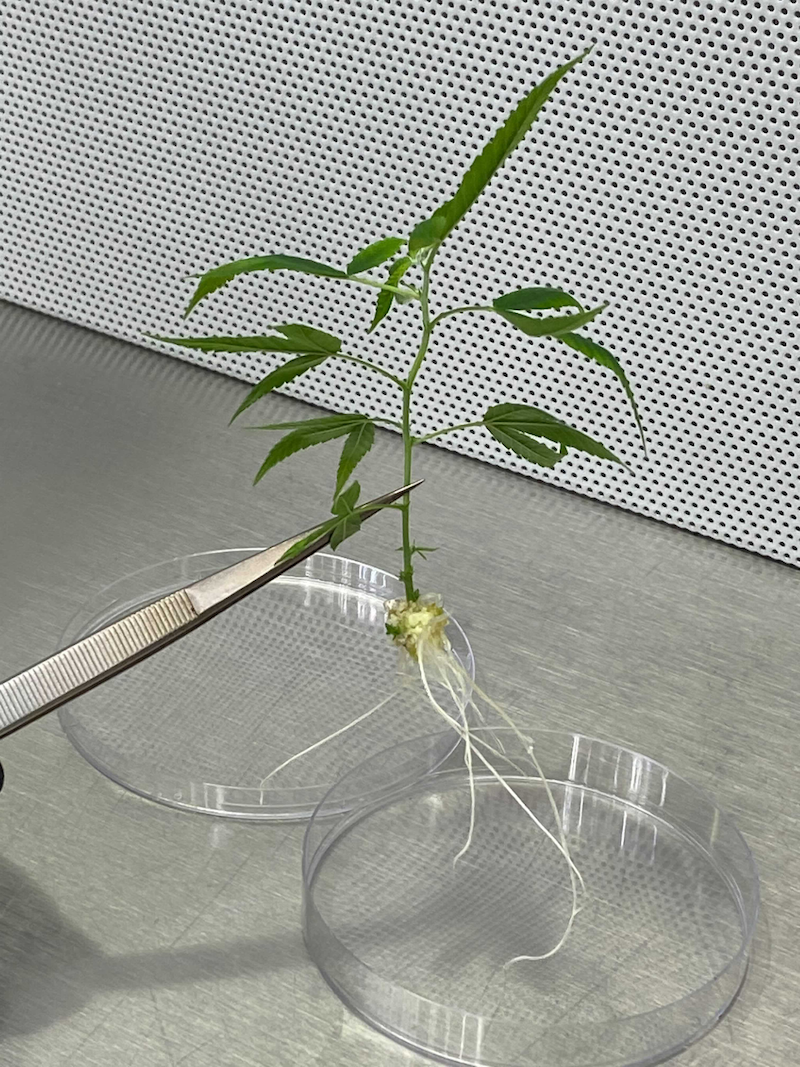 Photo: Mother Labs
Photo: Mother Labs the oz. — What are some of your most popular genetics?
Bain — There’s quite a few; I’m sure ones you’re very well aware of… Powdered donuts is one, we’ve got Mimosas on the market, we’ve got Z-Splitter, First Class Funk is getting a lot of talk right now, Cherry Punch is making a massive splash, Sour OG Cheese is out there now, Orange Tingz is one, Vanilla Ice. I could literally go down a list of 60-plus cultivars we have on the market right now. The thing that people don’t realize with our industry on the supply side is anything we do is not really released for a year. We’re constantly trying to read trends before they even exist. We often call ourselves ‘culture curators.’ A lot of people don’t realize that we’re looking very far ahead into the future.
the oz. — Do you find that LPs are all gravitating toward the same genetics at the same time?
Bain — What they’re gravitating toward is the certain THC percentage that the market wants, the certain terpenes the market wants, a minimum yield expectation. Right now it’s exclusivity. People want to be different. Unique cultivars hitting all those marks we’ve come to expect in the Canadian market.
the oz. — It’s hard to differentiate yourself, there are so many different products on the market.
Bain — I’m a cannabis user and have been for the majority of my life. I search for products that have positive effects, I like to feel good, I don’t like red eye, I don’t like pasties, I don’t like the traditional negative effects of cannabis. All of these different things work into our cultivar selection, what we put on the market. I also am a connoisseur. I like very high-quality cannabis, so I’m personally choosing every cultivar that moves forward and it has to hit on the terpenes, it has to hit on all markers. We call it a unicorn. If it doesn’t hit on all markers we’re literally junking it and not releasing it.
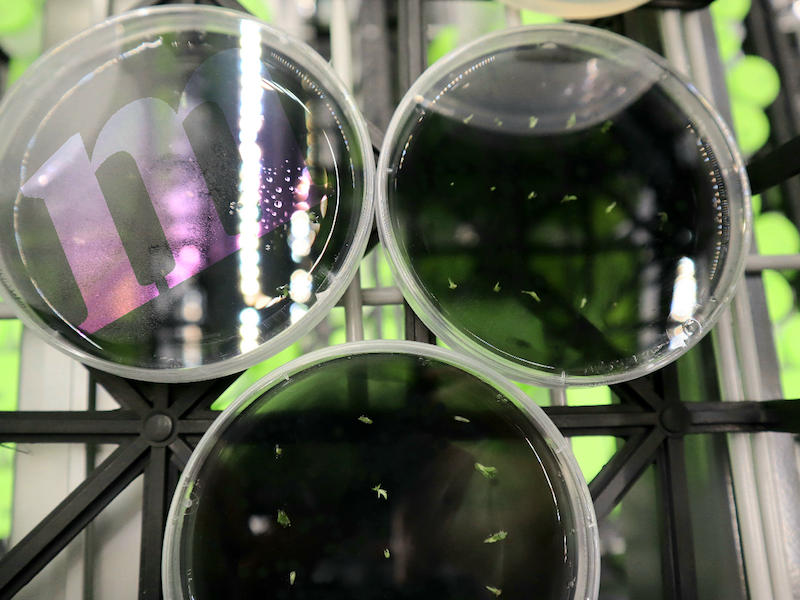 Photo: Mother Labs
Photo: Mother Labs the oz. — Are you working with growers in the Okanagan?
Bain — We’re involved everywhere. We do deal with a lot of people in the area. We’re meeting clients and looking at growth opportunities.
the oz. — Is there anything else you’d like to talk about?
Bain — If we could go back to the international play and the significance of that—as we grow, we are heavily concentrating on transitioning from a nursery to a different type of business. Every LP has hundreds of genetics. No one has a shortage of genetics. People don’t know how to manage genetics: they don’t know how to monetize them, they don’t know how to store them, they don’t know how to clean them. As we grow, we’re really transitioning into this different model—it’s not really a supply model, it’s more of a genetic management model.
the oz. — Do you have an ideal client that you like to work with?
Bain — We’re heavily concentrating on craft. That’s where I come from, it’s my world, it’s my background, it’s my passion, it’s the products I buy. We really want to work with craft producers and smaller producers. They need the most amount of help right now in the industry. We have services and products that can help them out a lot. That’s the biggest target is micros moving forward. We have different services for larger clients as well, I don’t want to cancel anyone out.
Extra
Leave a comment on our Facebook page.
© Copyright 2021 Okanagan Z. | About the oz.
Report a Typo or Inaccuracy
We strive to avoid typos and inaccuracies. However, on occasion we make mistakes. We value your contributions and help in correcting them.